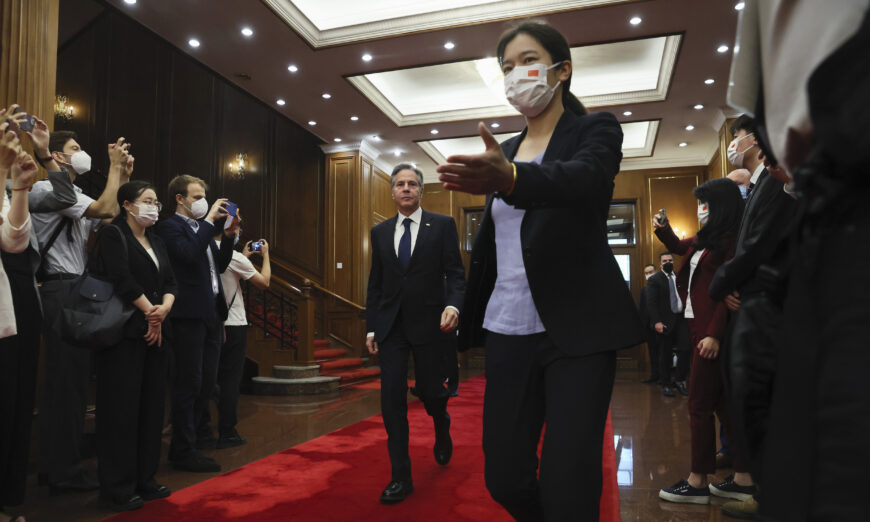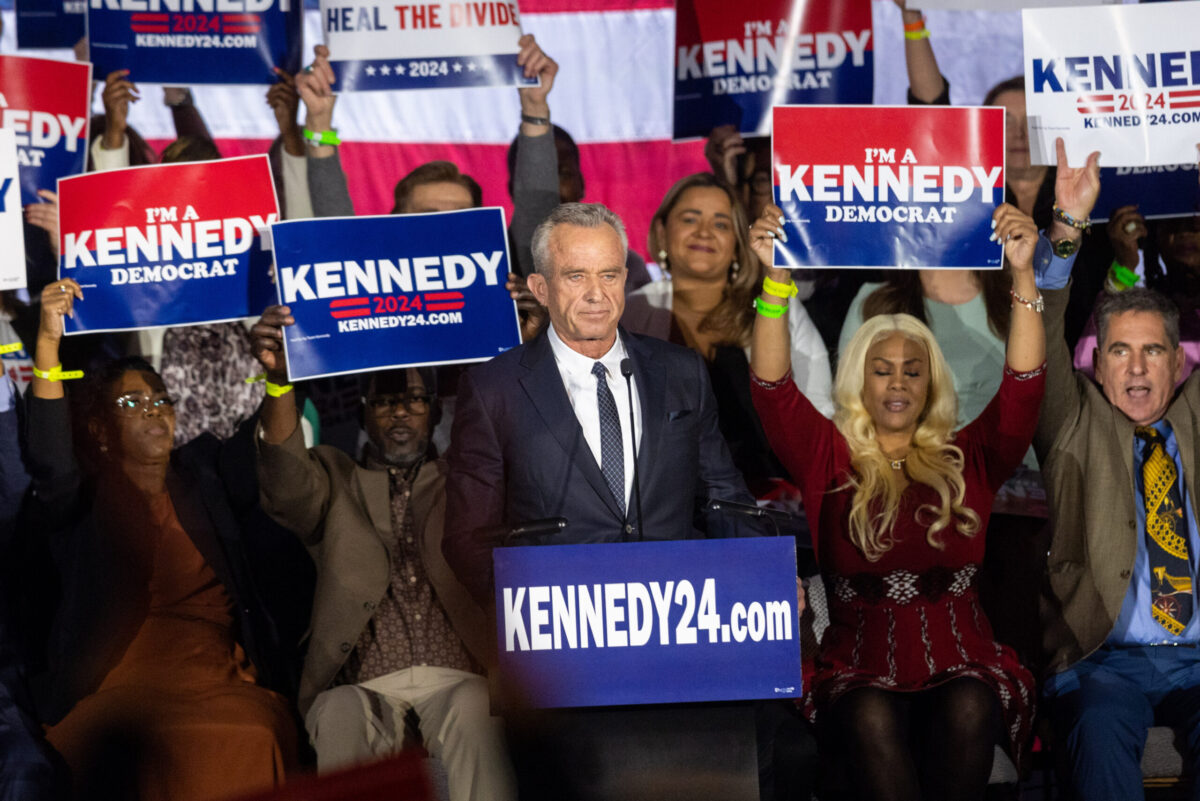IN-DEPTH: Reshoring US Industry from China Requires Defense-Driven Innovation, Economist Says
It’s increasingly the received wisdom in Washington: China’s military power and manufacturing capacity are twin challenges America must face.
Economist David Goldman wants to address the two together through vigorous industrial policy driven by smart defense spending–but his analysis has already met with skepticism in some quarters.
“The United States is going to go bankrupt eventually,” Goldman told The Epoch Times in an April 14 interview.
He cited the country’s long-standing trade deficit, which has been widening for decades as the United States continues importing more in combined goods and services than it exports.
Goldman worries about the country’s net foreign asset position. As of the fourth quarter of 2022, Americans were on the hook for more than $16 trillion in foreign liabilities.
“We take people’s goods and give them our paper in return. There’s a natural limit to how long you can do that. At some point, people won’t be able to take our paper,” he said.
The economist’s new article on domestic manufacturing is the latest in a series of “Provocations” from the Claremont Institute Center for the American Way of Life.
Goldman is known for his long-running “Spengler” column in the Asia Times, a perch that has let him closely observe the rise of China.
The economist pointed to recent indications of growing Chinese geopolitical strength despite American opposition, like Brazilian President Lula’s visit to a Huawei site in Shanghai and Beijing’s role in brokering a deal between Saudi Arabia and Iran.
Huawei is building Neom City, a smart city in Saudi Arabia near the Red Sea.
“The economic power that China wields through its export machine is giving it a whole string of diplomatic successes, and that diminishes American power,” Goldman said.
“If these trends continue, we’ll end up looking like Britain, as a former imperial power against the United States, with China in the position of the United States,” he added.
Spengler Against Decline
How would Goldman prevent, or at least stave off, the decline of the United States?
Part of the solution would be to subsidize an American equivalent to Huawei.
In some ways, that might be a return to form. Not so long ago, the United States brought the world Bell Labs, a powerful engine of innovation throughout the 20th century.
Goldman claims a certain kind of economic inefficiency made that possible.
“The government gave AT&T a monopoly. AT&T overcharged people for telephone services. And that enabled AT&T to support Bell Labs,” he told The Epoch Times.
The government-led breakup of Ma Bell saved consumers money. Yet, according to engineer Michael Noll and other Bell veterans, the end of AT&T’s monopoly made it harder to justify the long-range, fundamental research programs that led to inventions like the transistor and the photovoltaic cell.
Goldman advocates more government research and development spending, focused on basic science and not on picking winners and losers in the marketplace—a job he considers best suited to the private sector.
Unlike other industrial policy hawks, including former President Donald Trump, Goldman is not a big fan of tariffs.
“Tariffs are a very broad subsidy, and I think they’re a lousy one,” he said, arguing that Trump’s tariffs failed.
American education is another one of Goldman’s targets.
“Our engineering education is alarmingly poor,” he said, noting that China produces many more engineering majors than the United States.
Meanwhile, America’s brightest young minds follow the money.
In the words of one anonymous Twitter user, “almost all of the smartest guys I knew in college, guys who would have governed colonies in the 19th [century], are working email jobs or programming at a Tinder-for-dogs start up.”
“The smartest kids go to the big tech companies, where they hope to become millionaires by the time they’re 26,” Goldman said.
He wants to incentivize science and engineering education by bringing back the National Defense Education Act of 1958, a law motivated by the Soviets’ launch of the Sputnik satellite and attendant concerns about the nation’s engineering workforce.
Goldman would also boost the number of skilled factory workers through an apprenticeship system modeled on systems in Germany, Switzerland, and Scandinavia.
In addition to bolstering America’s labor pool, he would change the tax code to make life easier for capital-intensive businesses.
Manufacturing is a particularly capital-intensive sector; it requires a lot of real, physical goods, things like machines and production plants.
“It takes years to write off the investment in capital-intensive equipment, which is a big disincentive to companies trying to make investments in that area,” Goldman told The Epoch Times.
He also thinks the United States’ stringent regulatory environment hinders domestic manufacturing.
‘War is the Father of All Things’
Defense spending, perhaps the Provocation’s sharpest thorn, is central to Goldman’s plan for rebuilding U.S. manufacturing.
“At the peak of the Cold War during the late 1970s and the 1980s, defense policy demanded a wide range of innovations in weapons systems that required the discovery of new technologies,” he wrote.
Many crucial digital technologies, not least the Internet, started with help from the Defense Advanced Research Projects Agency (DARPA).
Goldman believes intelligent defense spending could help America innovate in manufacturing sectors at the far frontiers of science and engineering.
He summarizes his call to defense-driven innovation with a line from the ancient Greek philosopher Heraclitus: “War is the father of all things.”
That doesn’t sit right with economist Marshall Auerback.
Auerback, a researcher at Bard College, has written about industrial policy for American Compass and other outlets.
In an April 18 email to The Epoch Times, he cited the work of economist Seymour Melman, who warned of the dangers of the military economy.
Notably, many analysts believe the COVID-19 response placed the U.S. economy on something like a war footing.
Auerback questioned the efficiency and broader economic benefits of defense spending.
“Most weapons projects now require relatively little touch labor. Instead, a disproportionate share is siphoned into high-cost R&D (from which the civilian economy benefits little), exorbitant management expenditures, high overhead, and out-and-out padding, including money that flows back into political campaigns,” Auerback told The Epoch Times.
He conceded that any successful push for an industrial policy would require a justification based partly on national security, “especially among Republicans.”
“You won’t get bipartisan buy-in unless you bring the GOP onboard,” he added.
In an April 21 email to The Epoch Times, Goldman said Auerback “is certainly correct that there are more efficient ways to allocate R&D funding than military technology.”
Yet, “as a practical matter, we’ve never done anything else right. The digital age was the child of DARPA and the Cold War.”
“We’ve never done anything of real grandeur without a defense [or] space driver,” he added.
Taxes, Tariffs, and Woke Industrialism
Like Goldman, Auerback thinks basic federal R&D spending could stand to increase.
He, too, warned of the dangers of continuing to outsource manufacturing to China or Asia more generally, partly due to the risk of intellectual property theft.
“This is especially true in the automobile sector where the mad rush to electrical vehicles will ultimately destroy Detroit,” he said.
Auerback diverges from Goldman when it comes to tariffs and taxes. He told The Epoch Times he would target the latter at U.S. companies that offshore their operations.
As for tariffs, Auerback made the case that free trade orthodoxy in America is something of a historical accident.
“The idea of eliminating everybody’s tariffs instead of granting market access on a case-by-case basis seems to have come from the Wilsonian wing of the Democratic Party led by Cordell Hull, the Tennessee senator, who subsequently became FDR’s Secretary of State for 11 years,” Auerback said.
“Hull and other Southerners had always been for free trade because they had no industries in need of infant industry protection and wanted to sell cotton, soybeans, beef, and any other farm products to the markets of the European empires,” he added.
Indeed, sectional conflict over tariffs helped cause the U.S. Civil War.
Free trade picked up more steam immediately after World War II when the U.S. economy was virtually alone among advanced nations in being undamaged enough to supply the world with manufactured goods.
Auerback characterized the current period as a “40-year Reagan-Thatcher experiment with unmanaged capitalism,” one he believes must end.
He didn’t limit his criticism to Republicans and conservatives.
“Democrats must be careful not to use the rubric of national industrial policy as an excuse to pin on a bunch of their own political hobby horses, such as child care, or ‘equity’ mandates (which are highly inimical to good industrial policy),” he said.
Trade Divides Thinkers
A more fundamental challenge to both Goldman and Auerback comes from free trade advocates.
One is Donald Boudreaux, an economist at the Mercatus Center at George Mason University.
In a letter to Claremont’s Center for the American Way of Life, he characterized Goldman’s piece as a “stampede of economic misunderstanding and factual errors.”
Boudreaux pointed out that Americans’ net wealth has increased significantly over many decades, even as the United States consistently ran trade deficits.
The beginning of that period coincided with the rise of Japan as a manufacturing power–one that, like China, was forecast to pose a major economic threat.
Bryan Riley, director of the National Taxpayers Union’s Free Trade Initiative, told The Epoch Times that the United States’ reliance on imports is a two-way street.
“[It] also means foreign suppliers are dependent on the U.S. market for their success. And there is a big difference between ‘dependence’ and simply choosing to import certain products because it’s more affordable to do so,” he said in an April 19 email to The Epoch Times.
While Goldman claimed that America’s industrial policy was causing real incomes to fall, Riley cited data from both the Congressional Budget Office (CBO) and the Federal Reserve showing that incomes have trended upward over recent decades, even as free trade policies have come into effect.
The CBO data ends in 2019. The Federal Reserve data, which ends in 2022, shows real disposable personal income declining from 2021 onward–a period that coincided with much of the COVID-19 response, pandemic-era Congressional spending, and Joe
" Conservative News Daily does not always share or support the views and opinions expressed here; they are just those of the writer."



